Sport Wales Design Sprint Blog
5 min read Written by: Cory Hughes
Sport Wales support people to be more active and promote a healthier Wales. They are the national organisation responsible for developing and promoting sport and physical activity in Wales.
The Vision for sport in Wales:
Everyone can have a lifetime enjoyment of sport. We want Wales to be an active nation with as many people as possible inspired to be active through sport.
Sport Wales work in partnership with many organisations to deliver and develop sport and are responsible for distributing government and National Lottery funding through grants to community groups and elite athletes alike. We were invited to facilitate a design sprint focusing on improving how evidence-based funding decisions are made.
What’s a design sprint?
Design sprints combine business strategy, service-design, user-research and agile delivery, and started out at Google nearly a decade ago. They are a really effective way to accelerate service development. The main way this is achieved is shortcutting the typical build and launch stages in a traditional agile project. Instead, rapid ideation and prototyping within a compressed timescale allows you to learn about the viability of your service without committing all the time and resources you would normally need in building and refining an initial release or MVP. In the spirit of agile – this method allows you to fail-fast, pivot and succeed even faster!
Sport Wales’ design sprint
Sport Wales wanted to run a design sprint to develop the best way of investing, aligned to their strategy, where there is no participation-based data available. To maintain pace and focus, we timeboxed the design sprint to one week. Forming a multidisciplinary team we first voyaged deep into the problem space – allowing everyone to understand the current service through the eyes of Sport Wales users. Opportunities were identified and a prioritised roadmap developed for discovery and alpha projects.
In the first stage of the design sprint, we focused on the context by which Sport Wales allocate funding – we facilitated workshops and used service maps to help answer the following questions:
- Who uses the service?
- What are their needs?
- How are services delivered?
- What value is provided?
- How is Sports Wales perceived?
These questions were all considered in the context of user research Sport Wales had already undertaken to help understand the strengths and weaknesses of the current service.
What the Sprint told us
Having developed a shared understanding of the service we then ran a session to see how it aligned with Wales’ Digital Service Standards, a clear vision for change emerged which identified a need for objectively testing grant applications against a set of pre-defined evaluation criteria.
Sport Wales had already done a lot of work on using a ‘data-driven investment model’ to determine funding for partners where official data (e.g. ONS) already exists. An example of applying this method is in identifying latent demand from people who want to play a sport who are not currently; and also, identifying people who are currently playing and engaging in a sport. This background served as a good starting point and meant we were able to quickly develop the assessment criteria and methodology around existing principles for partners where there is limited or unofficial data.
We did some rapid prototyping of the assessment criteria in Excel and tested its fit using several of Sport Wales’ existing partners as examples – iterating and refining the model to be ‘good enough’ – proving it can provide value in supporting funding decisions and should be explored further.
What we learned:
Teams is hard!
Over the last couple of years I’m sure we’ve all said that Teams is hard at one point or another! Covid restrictions meant we needed to run the design sprint virtually. While this isn’t new anymore it’s still a challenge to run a week-long workshop and keep everyone engaged. Hats off though to the Sport Wales team who mastered it – staying focused throughout! Using a couple of facilitators and different methods meant we could keep things engaging and break things up a bit. Teams breakout rooms and Mural came in handy here. One of the best bits about Mural is that we were immediately able to capture the design outputs – which is great as you don’t need to waste any time writing things up!
How much time do you focus on context?
We spent most of the first half of the week focusing on context – building deep insight and asking ‘why’ multiple times. It’s hard to know what the right amount of time should be for this and there’s a fine balance between focusing on the old vs. the new – but it’s essential to robustly capture the current state – without this it’s impossible to test out new ideas and critically evaluate the effect of changes on users and services.
Keeping the energy flowing
We set out a simple timeline for the sprint ahead of time so everyone knew the outcomes we were looking for from each session – we managed to maintain a good rhythm and leave enough time for reflection. Most importantly, we flexed the plan where we needed to. For example, we spent more time prototyping the model as the thinking developed rather than planning next steps (recognising the strength Sport Wales have in planning and delivery).
Space, honesty, open mindedness
There was no place for hierarchy in this sprint. Everyone gave up their working week for this and Sport Wales’ commitment was second to none; there was a really organic feel to the discussion and everyone had an equal opportunity to participate – being open minded allowed us to solve the problem more quickly. It’s culture that’s made the difference and Sport Wales’ have cracked it!
What’s next?
Having done all the thinking and succeeded in completing the design sprint, Sports Wales now have confidence to further develop the opportunity of using evaluation criteria in the decision making process by taking this forward in their alpha planning. We’ll of course be celebrating with them as they pick up pace going into the next lap to success.




